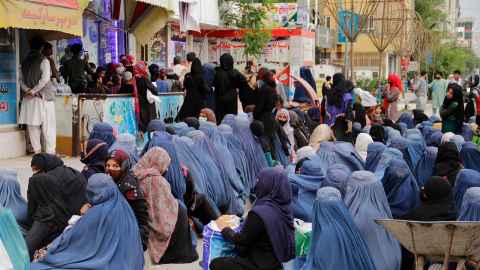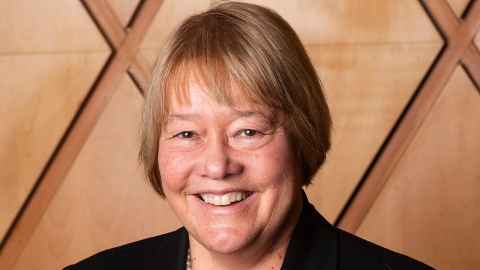Justice Dame Susan Glazebrook's promise to forget no one
28 October 2022
Opinion: Justice Dame Susan Glazebrook speaks out about the plight of female judges in Afghanistan.

In August 2021, the Taliban reached Kabul. This put the 270 female judges of Afghanistan and their families in grave danger. They were at risk because the idea of women judging men does not fit with the Taliban view of the world. They were also at risk because they were seen as being associated with the previous regime and with Western values.
The Taliban emptied the prisons, putting the judges in grave danger of retribution from the criminals and terrorists they had sentenced. The female Afghan judges had no choice but to go into hiding with their families and to try to leave Afghanistan as soon as they could.
A small committee of volunteers from the International Association of Women Judges (IAWJ) promised to help. We, naively as it turns out, thought the danger these judges (and other female activists) faced would be obvious and they would be one of the first groups to be included in the evacuation flights arranged before the withdrawal of foreign troops.
This turned out not to be the case. Only a small number of the judges were evacuated in this period, to countries such as Poland, Romania, Spain and the United Kingdom. And for most it was not an easy journey to the airport. The judges, often with young children, had to struggle their way through a crush of people in the searing heat, through armed checkpoints and finally wade through what had become a sewer.
It took up to 36 hours just to get into the airport. Our committee members were with them (virtually) throughout, encouraging and guiding them through our links with the troops and others inside the airport and, on one memorable occasion, with Google Maps.

These judges have been robbed not only of their identity as judges, but also as women.
After the withdrawal of foreign troops, there was a hiatus. Our committee was doing all it could to raise awareness of the plight of our sister judges in the hope the international community would respond. However, it was mostly left to non-governmental organisations, like the IAWJ, to take on the responsibility for further evacuations. It was a major relief to our committee when a good number of our judges were included on charter flights in October 2021 to interim destinations including Greece, Albania and the United Arab Emirates.
We are so grateful to our partners, including the International Bar Association and the Aleph Foundation, for organising these flights. We are also grateful to our interpreters, those who set up and maintain our database and all the dedicated pro bono lawyers who have assisted our judges with immigration advice. And to the funders, including generous donations from New Zealand.
We are particularly grateful to the countries where our judges have been accepted for final resettlement, including Australia, the UK, Germany, Spain, Ireland, Canada and the US. New Zealand has also welcomed six judges and their families. All these countries are lucky to have such courageous, dignified and talented women, who will make a real contribution to their new country.
But it will not be easy. They need to adjust to a new language and a new culture, as well as retrain.
And, all the while, they’re grieving for their old lives and desperately worried about family members and friends they had to leave behind. They are also very worried about their colleagues still in Afghanistan. Some 70 female judges remain trapped there. These judges have been robbed not only of their identity as judges but also as women.
The Taliban, far from being a new and more modern Taliban, have failed to reopen secondary schools for girls, have imposed stringent travel restrictions on women and require them to cover themselves completely in public (but preferably to stay home). And the danger is increasing. The Taliban is more organised, the security situation is deteriorating and there is a major economic crisis, including food shortages. Evacuations are more challenging. Charter flights seem no longer possible and funding and visas are harder to secure even to interim destinations.
The idea of women judging men does not fit with the Taliban view of the world. They are also at risk because they were seen as being associated with the previous regime and with Western values.
We are determined, however, to try to fulfil the promise we made last August to forget no one.
Our training and experience did not prepare our committee for a major humanitarian effort of this kind, but to give up now would be impossible as a matter of integrity and as IAWJ members dedicated to gender equality, human rights and the rule of law. The real heroines, however, are the Afghan women judges.
I pay tribute to them.
Justice Dame Susan Glazebrook (DNZM) is a Supreme Court judge and distinguished alumna. She is president of the International Association of Women Judges.
This opinion piece is from the University of Auckland's alumni and friends publication Ingenio, Spring 2022 issue. It is the opinion of the author.
To republish in full or part, please email: ingenio@auckland.ac.nz